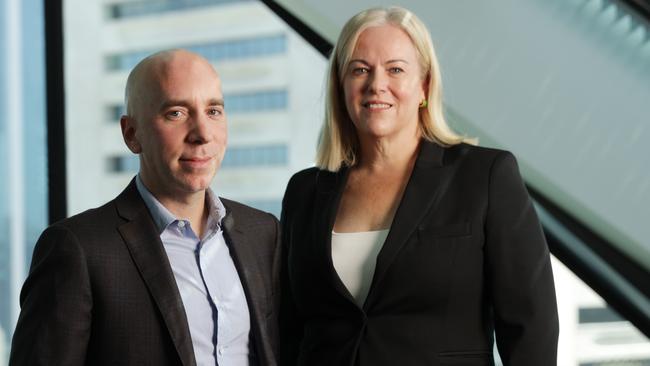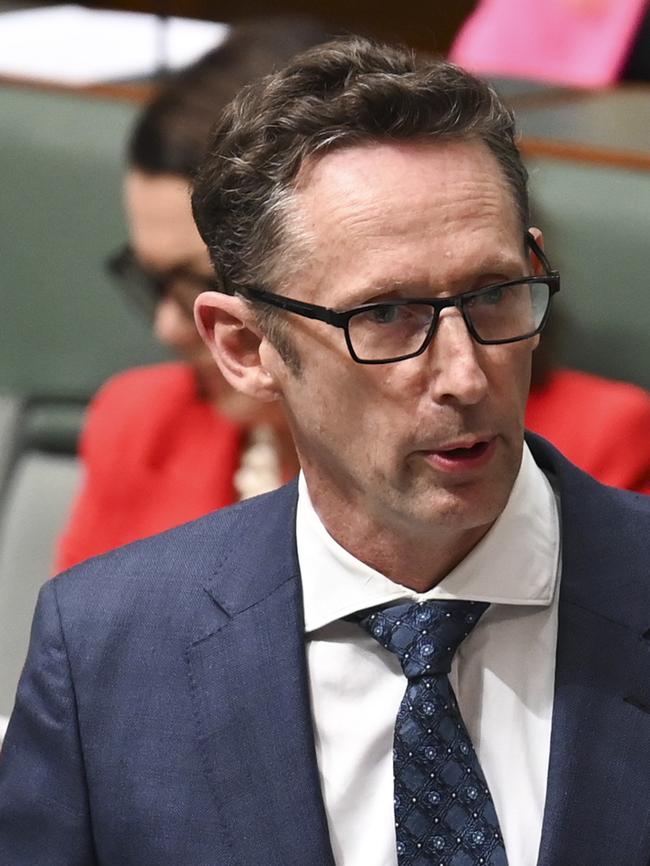Fines for tech giants over social media scams
Social media giants such as Facebook will have to front up to Australia and answer for fraudulent or criminal scam content published on their platforms under new Labor legislation.

Social media giants such as Facebook will have to front up to Australia and answer for fraudulent or criminal scam content published on their platforms – and potentially also pay compensation to scam victims – under new legislation to be introduced within weeks.
The draft legislation will not only set binding codes that impose specific obligations on social-media platforms, banks and telecommunications providers, but also create an independent dispute-resolutions body with the power to enforce heavy fines and penalties on industry players that fail to meet them.
Assistant Treasurer Stephen Jones told The Weekend Australian that although banks and telcos were now doing more to combat scams that cost Australians $2.74bn last year, social-media platforms had to do a “much better job of removing unlawful, criminal and fraudulent content on their websites”.
“Right now they are making advertising revenue out of that (fraudulent and criminal content),” Mr Jones said.
“You could not publish the content that they publish on their platforms in any newspaper, on any TV station or radio station in the country and not be held liable. Yet apparently they can. That is about to change.
“Once we get codes in place it will put paid to these activities. There will be obligations on them to remove content – report and respond obligations.”
The bill, to be introduced to parliament by July, is the second phase of the federal government’s strategy to combat a “scam-demic” that an investigation by The Australian has revealed is claiming victims at both ends of the crime.


Australians are losing billions of dollars a year to scams perpetrated through platforms such as Facebook and Instagram, as well as SMS and WhatsApp, by trafficked and enslaved workers lured into scam centres across Southeast Asia through fraudulent recruitment ads on those same platforms. Myanmar, Cambodia, The Philippines, Laos and increasingly Dubai are now the global centres of “pig butchering” or romance scams, named for the process of “fattening up” victims before the “kill”.
Another major scam front is through fraudulent crypto-currency finance schemes advertised on Facebook and run out of call centres in Serbia, Cyprus, Ukraine, Georgia, Romania, Moldova and The Philippines.
Mr Jones said the government’s anti-scam strategies were beginning to pay off with quarterly data released this week showing Australians reported $73.2m in losses to Scamwatch (down 10.2 per cent), $173.2m to ReportCyber (down 3 per cent) and $99.2m to the AFCX (down 41.2 per cent).
But the global investigations experts appointed to independently monitor Sydney’s Crown casino and Adelaide’s SkyCity casino have warned online fraud now poses as serious a threat as transnational drug smuggling and should be treated with the same degree of urgency.
Cem Ozturk, Australia and Asia-Pacific forensic investigations managing director for Kroll, said the Australian Federal Police were “doing a good job dealing with narcotics” out of Asia, “but the bigger issue which impacts people’s lives in Australia, the US and elsewhere is fraud”.
“If they applied the same amount of effort that they have done to countering narcotics it would be a positive thing,” Mr Ozturk said. “It is not glamorous, it doesn’t make for good headlines but, day to day, people are being defrauded of what might seem like small sums of money but in aggregate are huge sums of money.”
Mr Ozturk said organised crime syndicates running massive diversified scam centres out of “ungoverned spaces” in Southeast Asia, particularly Myanmar, were operating in a way they knew would “fall through the cracks” of regulatory surveillance in Australia, and governments ignored those areas at their peril.

“There is a sense in Australia that these things are happening far away in Asia or in other parts of the world, but Australia is an attractive, stable economy and a great place to launder money,” he said. “What is happening in Myanmar or Cambodia may seem very distant, but it is directly connected to what is happening here (Australia).”
Mr Ozturk said Australia’s opinion was well-respected in the region, and it would be in the national interest for the government to take a more active role on issues such as Myanmar where a 2021 military coup has plunged the country into violent chaos and created safe havens for crime.
Australia’s crackdown on money laundering in Australian casinos had been closely watched in Asia and in other places around the world, he added.
Mr Jones acknowledged the government had more work to do to combat online scams and that there would be a third phase to its strategy, which began with the creation last year of the National Anti-Scam Centre (NASC).
But bringing social media giants, banks and telcos “into the frame” by imposing specific obligations on each sector was an important step in creating accountability for the issue.
“For banks that will include a crackdown on mule accounts and confirmation of payee, anti-fraud and scam prevention, report and response mechanisms and data sharing through NASC,” Mr Jones said.

For telco providers, it means cracking down on loopholes that allow scammers to spoof corporate numbers to send mass fraudulent SMS messages, and creating a “white list” electronic register of companies so that only those on that list can send mass SMSes.
Any scammer that tries to use a trusted name or brand via SMS would be blocked, he said.
More than a billion calls and SMSes have been blocked in just the past few months alone in a revolving game of whack-a-mole.
Social-media giants such as Meta, the parent company of Facebook, Instagram and WhatsApp, will also be required to establish clear channels for complaints about fraudulent or criminal content and internal dispute resolutions.
“At the moment if you have a problem you send off an email and get some AI-generated response,” Mr Jones said. “That won’t be good enough. There will need to be a mechanism in place for people to raise a complaint.
“If it can’t be resolved internally then there will be an external dispute resolution process which will require people in-country.
“If they have an obligation to take something down, they don’t and then someone loses money as a result, fines and penalties will apply. We are working through the details of that now but they will be substantial.”
Mr Jones said Facebook Marketplace in particular had become a “toilet”, and that parent company Meta had become “one of the greatest distributors of criminal content, in particular economic crime”.
Meta’s recent protestations in a submission to the government over its proposed mandatory industry scam codes that it “may be impossible” to protect its users from losses because of the rapidly evolving tactics used by scammers to evade detection were “preposterous”, he added.
“These guys have the best technology in the world,” he said. “They can use their algorithms to target our preferences and focus advertisements based on the things they know we do and like.
“They can remove journalists and news content from their platforms, as they have in Canada, but they don’t have the capacity to remove fraudulent, criminal content? Give me a break. I hope they don’t have to be dragged kicking and screaming to do the right thing but if that’s what it takes then that’s what we will do.”







To join the conversation, please log in. Don't have an account? Register
Join the conversation, you are commenting as Logout